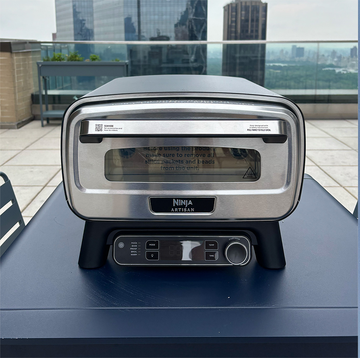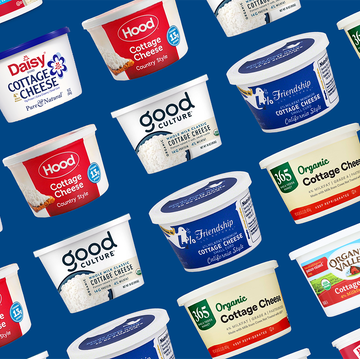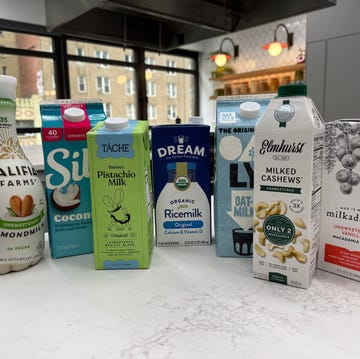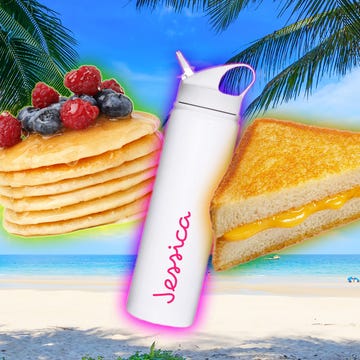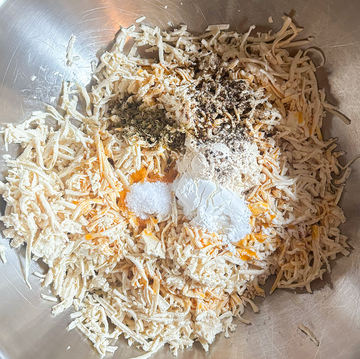Standing in heels in a pink dress at nine months pregnant, Allison Ellsworth makes the case for her apple cider vinegar beverage company, Mother. The then-31-year-old from Texas pitches the idea with her husband, Stephen, on a 2018 episode of the ABC hit show Shark Tank. The couple points out the drink’s purported health benefits (preventing sluggishness and bloating) and their projected sales (a million dollars that year), but the panel of deep-pocketed investors remains skeptical. Mark Cuban hates the taste, Kevin O’Leary frets about competitors, and Bethenny Frankel calls their manufacturing approach a "disaster." But then, a miracle: Rohan Oza, whose expertise lies in consumer beverages after working on Coca-Cola, Sprite, Smartwater, and Vita Coco, decides to invest, offering them $400,000 for a 25% stake in the company. In getting his endorsement (and cash), the Ellsworths have "won" the show.
They stay winning today. After renaming "Mother" to "Poppi" and adopting a punchy, neon aesthetic, the Ellsworths’ little soda business became one of the biggest food and beverage stories of the decade, soaring to a reported $100 million in annual sales after just three years with its new name. Earlier this year came the biggest win of all: Pepsico announced plans to acquire Poppi for a staggering $1.95 billion.
The brand has succeeded amid a bizarre moment in American wellness culture, when consumers are focused on calling out the food dyes and evil syrups in their processed foods while simultaneously ponying up for packaged products with vague definitions of "clean" ingredients—and even hazier health claims. Poppi, with its low sugar content and supposed gut-healthy benefits, is one of the most financially successful examples of the trend seen in grocery aisles across the country. And even with a class-action lawsuit attacking its health claims and a few minor TikTok influencer-led controversies over the years, its sales only continue to build. How has Poppi managed to avoid fizzling out?
'Mother' Is Born
It’s a very charming, wholly American story. After graduating from college in 2009, Allison began her career in the oil and gas industry with duties that involved a lot of domestic travel and living out of a suitcase. While she met her husband, Stephen, on the road in Utah, there were downsides to her nomadic lifestyle. It kept her from fresh food and regular exercise, and her health suffered. While researching ways to improve her stomach issues, she learned about the benefits of apple cider vinegar and began gulping shots of the stuff.
Allison says she noticed a difference in her cystic acne and "debilitating" digestive issues within days of drinking vinegar, but wanted to find a way of diluting the harsh flavor. "Tinkering" is the word she most often uses in interviews to describe the process that came next in her kitchen, as she tried to make a beverage for herself that was more palatable by brewing teas, simmering fruits, and infusing vinegar and juices into sparkling water until she finally felt satisfied with a low-sugar, flavorful, kombucha-like soda. She started sharing the drink with friends and neighbors and, with her father’s encouragement, decided to sell it. In December 2015, after Allison and Stephen moved to Dallas to be closer to relatives while starting a family of their own, Allison launched her business with just a few bottles at a farmer’s market.
It only took three weeks before a Whole Foods buyer asked the Ellsworths if they were interested in selling the soda in its grocery stores. Allison had just begun her second trimester of pregnancy, and the couple had just purchased their first house together, but with a great gut feeling (no pun intended, really), they decided to go all in. They quit their jobs, pooled their remaining savings, and raised $125,000 to open a production facility. "At that point, it had taken off quite a bit at the farmer’s market, so we were spending 10-hour days filling these by hand," Allison told DFW Child in 2022. "If you’re going to sell in stores, you have to be in commercial kitchens. So we signed a lease and just started making plans to really grow this."
In the company’s first year, they got placements in a dozen stores across Texas and hit half a million dollars in revenue. Ellsworth was pregnant with the couple’s second child when they appeared on Shark Tank in December 2018. "They are like, 'Are you sure you can fly?' I’m like, 'I will have my baby in California. I am coming to Shark Tank," she said. She gave birth to their son Sebastian two weeks after taping the show.
The company spent 2019 tinkering once again, specifically on a rebrand. The product sold on Shark Tank was an apple cider vinegar-infused beverage in a glass bottle called Mother, with the logo in stately script. The overall effect was something your hippie aunt might carry in a crocheted purse to her book club meeting. In March 2020, it reemerged as Poppi, a healthy soda with a bold logo splashed on neon-colored cans. Its first four flavors were Strawberry Lemon, Orange, Ginger Lime, and Raspberry Rose.
Their new aesthetic was both retro and futuristic, says Henrik Hagtvedt, Ph.D., the chairperson of the marketing department of Boston College. "It’s definitely retro in terms of the colors and stylized fruit images that take center stage, but it’s unusual to have the brand name relegated to placement on the side. You don’t really see that on soda cans," he says.
Poppi’s promotional language, with taglines like "Soda’s back" or "It’s time to love soda again," also looked back and forward, and it’s just one of several pleasing paradoxes Hagtvedt points out. When the company leaned into identifying itself not as a health beverage but as a not-so-bad-for-you soda, the product suddenly seemed like a fun treat. "In a time when brands are trying to exaggerate how healthy they are, Poppi is kind of understating it by labeling their product as a soda," he says. "There's a widespread notion that a lot of foods and beverages can be either healthy or tasty, and this seems like a way to signal that it's both."
Poppi Pops Off
Their marketing efforts went beyond visuals, though. As part of the relaunch, customers could buy cases on Amazon in what was essentially a direct-to-consumer model. It soon became the #1 drink on the platform.
Allison also created a TikTok account. Her first viral post in January 2021 was a simple, selfie-shot video explaining her founder story in less than a minute. "I went to bed and I woke up the next day and the video had gone viral with millions of views," she told Inc. in 2023. "We’d done $100,000 while we were sleeping on Amazon."
In keeping with the Gen Z-beloved platform, Poppi’s TikTok content is casual and intentionally unpolished, featuring shaky cams and minimal editing. Allison appears in most of the videos, often dressed in hot pink with glam makeup and mermaid-wavy blonde hair. Occasionally, she appears in pajamas or at home in a messy ponytail and glasses. Mega successful founders—they’re just like us!
Meanwhile, the brand reached millennials where they still reside: Instagram. The brand worked with both macro- and micro-influencers on paid partnerships and got their cans in the hands of major celebrities, too. In the summer of 2021, Oza from Shark Tank and his company, CAVU Ventures, led a round of fundraising that included celebrities like Olivia Munn, Nicole Scherzinger, Halsey, The Chainsmokers, and Ellie Goulding. Jennifer Lopez claimed to have sipped Poppi on the set of a music video in 2021, and Billie Eilish said in an Apple Music TikTok in 2022 that she had to have Poppi backstage per her rider.
Kylie Jenner and Hailey Bieber were photographed with the same green can of Poppi in the same week in 2023. And in 2024, the brand had a "house" at Coachella decked out in greens and yellows so mega influencer Alix Earle could introduce the new lemon-lime flavor while spinning in lime-shaped floaties in the pool. Later that year, Post Malone signed on as a partner and investor of the brand and got a limited-edition can design for his favorite flavor, Wild Berry.
Online Drama Fizzles Over
But it wasn’t all light and bubbly. The prebiotic soda Olipop hit the market at roughly the same time as Poppi, introducing near-identical competition. And in June 2024, customer Kristin Cobbs filed a class-action lawsuit against Poppi for false and misleading advertising.
Cobbs protested that the amount of Poppi one would have to consume to feel the fiber benefits would contain so much sugar that it would negate the possible healthy effects. In a simple statement, Poppi responded, "We believe the lawsuit is baseless, and we will vigorously defend against these allegations." While the law firm representing Cobbs did not respond to repeated requests for comment, filings show the case was quietly settled on March 18, 2025, for $8.9 million (and any customers who purchased a can or more since 2020 are able to submit a claim to get a piece of that figure).
While many nutritionists and registered dietitians give a side eye to Poppi’s gut health claims—and beg you, please, to simply eat a scoop of yogurt or piece of broccoli—the soda’s low-sugar content is legit, says Jaclyn London, a registered dietitian and author of the book Dressing on the Side (and Other Diet Myths Debunked). "The number-one source of added sugar in the American diet is beverages. That's what makes sodas so damaging: They don't provide any nutritional benefit," she says. "So if you're swapping [Poppi] for regular soda, I'm a thousand percent on board." She points to the sugar in Poppi, which is five grams per can, as opposed to a can of Coca-Cola, which has 39 grams. "You’re making a huge change just by making a one-for-one swap."
The brand kicked off 2025 with another unfortunate blunder: Ahead of their Super Bowl ad, they delivered full-size vending machines stocked with nothing but Poppi to more than 30 influencers, who posted their awe and delight over the luxurious mega supply of free soda.
It wasn’t so different from their splashier stunts in the past, like Alix Earle’s Coachella house. But Gen Z, who have pitchforks prepared for the rich at all times, immediately lashed out in the comments of these TikToks, suggesting the machines should have been placed in schools or hospitals. "It blows me that brand STILL dont understand that consumers dont wanna see already wealthy influencers get these insane trips/pr packages," one commenter noted.
Allison once again turned to the forward-facing camera on her phone and addressed the controversy, apologizing for the tone of the campaign. "It would be very unlike me and Poppi to not just talk about this head-on with all of you. First of all, I hear you," she said in the video. "Creator marketing has always been a staple of Poppi’s brand since we launched in 2020, but I know it’s you, our community, that has been the biggest part of our success. We can always learn and do better." She wrapped things up by promising the vending machines will be going wider in the years to come and encouraging followers to nominate places and people who might deserve a drop.
It’s not a tactic that all crisis PR experts would have recommended. "They prolonged the news cycle," says Kieran Powell, an executive vice president at the public relations firm Channel V Media. "The crisis was more like crowdsourced feedback telling her what to do next, but by not doing anything and instead making a public apology, she gave herself a platform to be publicly shamed." He thinks Poppi could have placed the vending machines in highly foot-trafficked places like Times Square after the Super Bowl so regular consumers could benefit instead.
Ronn Torossian, the founder and chairman of 5WPR, sees it differently. "In today’s media landscape, transparency and authenticity win. The days of polished, corporate-style crisis statements are over,” he says. "Consumers, especially younger ones, see right through them. A direct, personal response like Ellsworth’s is exactly what’s needed. It humanizes the brand and makes it relatable. If done right, as it appears it was here, it can effectively reframe the narrative and regain consumer trust. Crisis management in 2025 is about meeting people where they are, and in this case, that’s TikTok, with real talk."
Poppi Meets Pepsi
But the multi-million-dollar lawsuit and Super Bowl blunder couldn’t stop the tide of a long-rumored acquisition. On March 17, PepsiCo announced it had entered an agreement to acquire Poppi. "[T]he Poppi brand's unique intersection with wellness and culture is a perfect addition to our portfolio," Ram Krishnan, the CEO of PepsiCo Beverages U.S., said in a statement. "Allison and the Poppi team have built a magnetic brand that's ahead of the trends, with a loyal consumer base and a demonstrated capacity for growth. We are big fans of the poppi brand movement and believe this incredible brand, paired with our commercial capabilities, will drive continued growth and innovation for years to come."
"I hope our story inspires others to explore their passions, take the risk, and believe that anything is possible," Allison said in the same announcement.
As the deal is still mired in the regulatory approval process, Poppi did not provide further comment in an interview with Delish for this story. They did, however, share news of their latest flavor, Alpine Blast, which has a citrus taste and 55 mg of caffeine, the equivalent of about a half cup of coffee.
London suspects that the brand will back away from its health claims even further after the acquisition. "I ultimately think they will have to remove any and all gut health marketing through the acquisition, because Pepsi does not play fast and loose with claims like that," she says. "So either [Pepsi] is going to fund the research and bring the gut health claims back, or they're going to remove the claims and lean into the lower sugar alternative."
It’s hard to see where Poppi goes from here—if the branding will change, if the fiber benefits will hold under corporate scrutiny, and if gut health will continue as the wellness trend du jour. But one thing is certain: Rohan Oza is probably pretty psyched that he bet big on the beverage during his time in the Tank.
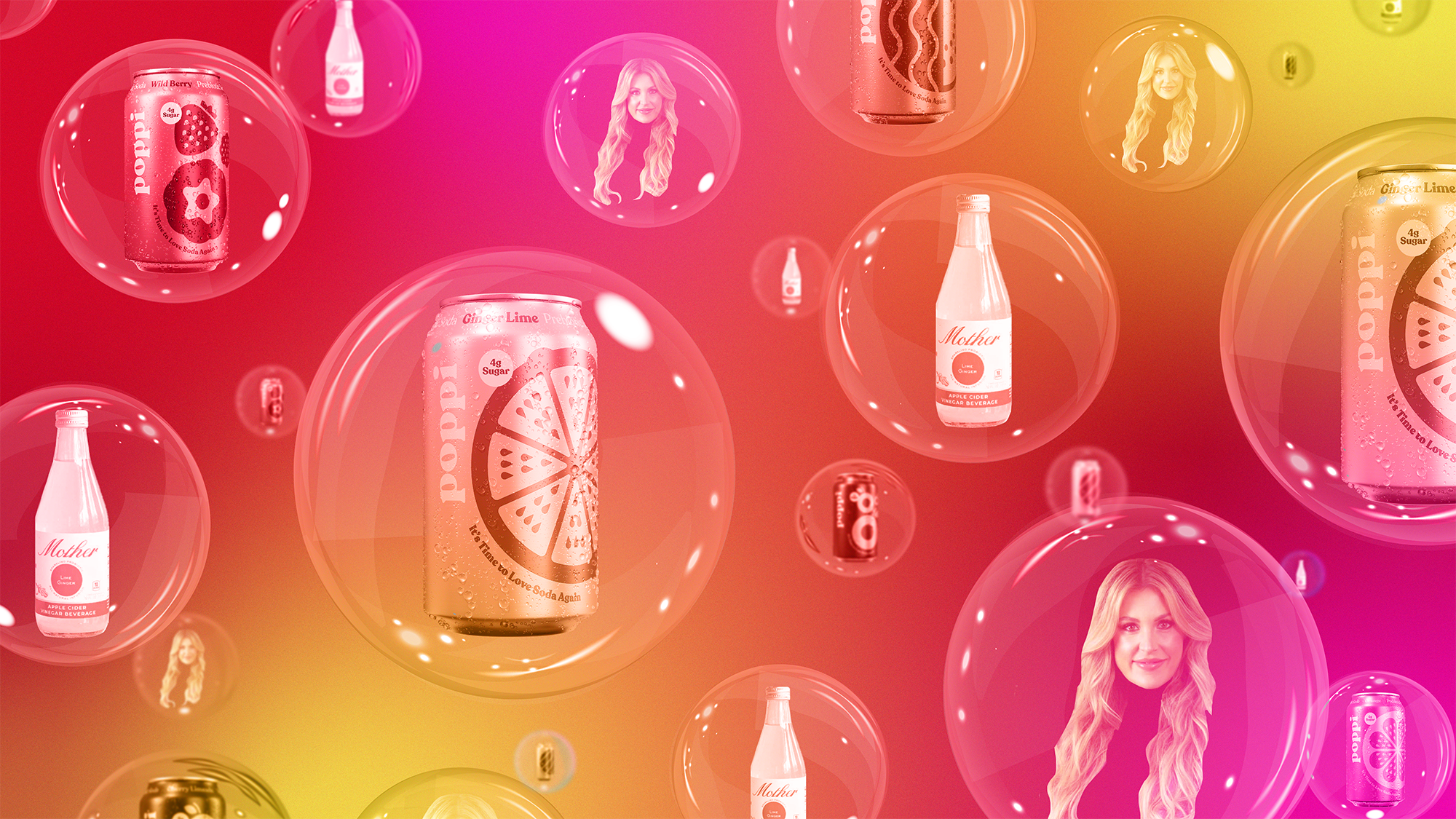


![a quote that says "in a time when brands are trying to exaggerate how healthy they are, poppi [labeled] their product as a soda." a quote that says "in a time when brands are trying to exaggerate how healthy they are, poppi [labeled] their product as a soda."](https://hips.hearstapps.com/hmg-prod/images/25-del-poppi-quotes-r1-quote-1-68190688039c1.png?resize=980:*)



![poppi quote a quote that says "the number one source of added sugar in the american diet is beverages...so if you're swapping [poppi] for regular soda, i'm a thousand percent on board."](https://hips.hearstapps.com/hmg-prod/images/25-del-poppi-quotes-r1-quote-2-681906d91eaa8.png?resize=980:*)




